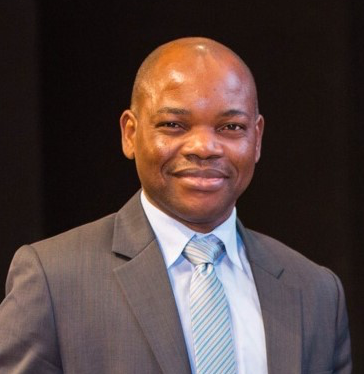Our latest student spotlight features Felly Chiteng Kot, a student in our online graduate certificate in institutional research. Read on to learn more about Felly, his research interests, and why he chose FSU.

What are your past/current areas of research?
My primary research interest focuses on factors that impact students’ academic performance/success. I am particularly interested in using a quasi-experimental research designs to examine these factors. Some of my previously published studies include the impact of academic advising, the impact of students’ use of library resources, and the impact of time allocation on academic performance. (I worked on this last study as a project in two of my IR Certificate courses.) Currently, I am working on a study that examines differences in academic performance between students admitted to our undergraduate program directly and those who are admitted only after completing our yearlong preparatory program. I am also working on a study that examines students’ use of Writing Center resources and how it impacts academic outcomes. Another key area of interest to me is change in student experiences and perceptions (more broadly), using longitudinal surveys. This was my IR Certificate capstone project, and I am currently expanding this study.
Why did you choose the Institutional Research certificate program at FSU?
Although my academic background is higher education policy and administration, I had no formal training in Institutional Research when I entered this profession. After six years of practice, I determined that I needed to take my IR expertise to the next level. The main reason why I chose to pursue an IR Certificate is that I wanted to have a structured context in which I could explore and learn more about the theory and practice of IR. A graduate program seemed to be the perfect setting. Another reason (which is related to the first one) reason is that when I was hired for this current position, I was assigned the mission of developing institutional research capacity at this institution (which did not have any IR capacity before my arrival) and also helping other universities in the country develop such capacity. I wanted to use the program as a platform for me to critically reflect on what I had achieved (in building IR capacity at my institution and introducing other Kazakhstani academic institutions to IR) and see how to go to the next level. I am located outside the US, so I needed an online program. FSU was one of the few universities with an online Graduate Certificate in IR. I looked at the program and compared it to other programs and determined that it was of top quality and offered the type of courses that interested me the most. In addition, the program was more affordable than other programs that I explored.
What awards or accomplishments have you earned in IR/education research?
I have been awarded a certificate of recognition from the President of Nazarbayev University for contributing to the development of the University (through my IR work). I have published several studies and have presented at international conferences (particularly the Association for Institutional Research and the European Association for Institutional Research). However, in my IR profession, the accomplishments that I see as more significant are when I produce analyses and studies that address issues of strategic importance to our stakeholders and have evidence that stakeholders find the insights relevant/useful. For instance, this month (October 2020), I just produced a study, based on a major survey, that examines different aspects of students’ experiences with remote learning. This study is currently generating a lot of interest and discussions at all levels (administrators, faculty, and students). Other accomplishments that I consider to be significant include mentoring new IR staff, organizing IR workshops for other universities in the country, and successfully organizing the first national IR Forum in the Republic of Kazakhstan.
What is your current professional role and organization?
I am the Head/Director of Institutional Research and Analytics at Nazarbayev University (NU). NU is an emerging world-class research university founded by the government of Kazakhstan in 2010. My role is to build institutional research capacity and oversee the implementation of our IR strategic plan at NU. I focus on four key priorities: (1) producing data, information and insights to support evidence-based decision making; (2) fostering an analytical/data-driven culture at NU; (3) advancing institutional research practice in Kazakhstan; and (4) contributing to knowledge production on higher education in Kazakhstan (through research, publications, and conference presentations).
 What coursework did you find most valuable in your continued work in education research?
What coursework did you find most valuable in your continued work in education research?
Looking at my entire graduate training (including IR certificate courses), I would say that quantitative research method courses and courses with a strong application component (i.e., those with an opportunity to work on real projects) have been the most valuable. I am happy to say that every single IR Certificate course that I took at FSU had a strong application component. Every course that I took gave me the opportunity to work on issues/questions of interest to my institution or to the broader higher education context. In addition to the two required courses, I took Data Driven Decision Making, Data Analysis for Institutional Research, and Data Mining. I also took Management in Higher Education (a course that I found to be particularly important for those working or aspiring to work as Directors of IR). Each of these courses has indeed contributed in a concrete way to my work in IR.
What advice or opinions about the IR Certificate would you want to give program to a prospective student?
The program offers coursework that really fits the needs of people with or without IR experience. I started the program with six years of experience in IR and had classmates with no prior IR experience. If you are an experienced IR professional, the program will offer a platform for you to reflect on your practice and give you an opportunity to work on issues of interest to your institution. You will be able to take your expertise to the next level. I would recommend you use each course as an opportunity to work on concrete projects that will be of benefit to your institution (e.g., a report to be disseminated at your institution or a study to be presented at a conference or published). If you have no prior IR experience, you will learn a lot from your instructors and classmates, and you will be exposed to resources that will help you grow. In considering what electives to take, I would strongly encourage (prospective) students to consider Data Driven Decision Making, Data Analysis for Institutional Research, and Data Mining.

